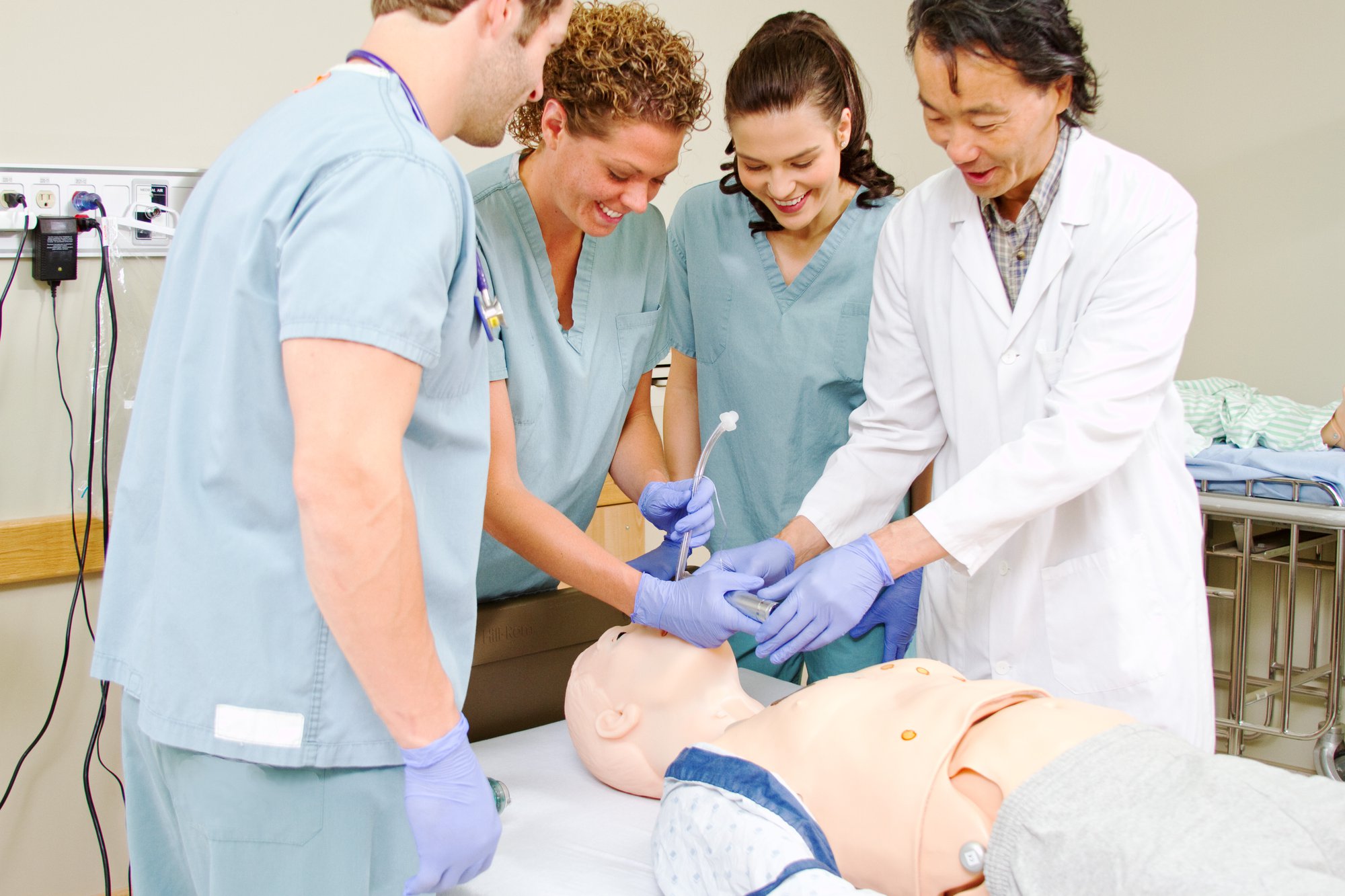Top Nursing Certifications You Should Have in 2024

To be or not to be… certified. Many nurses ask themselves that question. Over one million Registered Nurses have decided that yes, certification is the way to go. And if more than one third of the nursing workforce agrees on this, they are likely onto something. Seeking nursing certification can be a great way to advance your career, specialize in a field of particular interest to you, and set yourself apart from the competition.
There are hundreds of nursing certifications options available, so choosing the right ones can be overwhelming. That’s where we come in. We have compiled a list of the best RN certifications to help you gain a competitive advantage in your field.
Before we discuss some of the best certifications to get in 2024, let’s discuss why having them in the first place has become such an essential part of a nursing career. Read on to better grasp what certifications are and why you should consider becoming a certified nurse.
Why Are Certifications Important?
There’s a myriad of advantages to getting one – or more – nursing certifications. With certification comes the validation of one’s skills, knowledge, and abilities. The value of certification helps all the healthcare industry players: the patients and their families, the employers, and of course the Registered Nurses themselves.
Certification provides further confirmation for patients and families that the RNs taking care of them are highly-trained, professional, and competent. Multiple studies show that nursing certification has a positive impact on patient care and patient safety. Moreover, being cared for by certified nurses is a preference among Americans. A 2002 survey shows that, if given a choice, over 73% of people would choose a hospital that hires a higher percentage of nurses with specialty certification.
Nurse certification is equally important to employers. First of all, employing a more significant percentage of Certified Nurses is how hospitals differentiate themselves from the competition. It’s also a way to ensure that a particular medical institution has attracted the most qualified individuals – a badge of honor for the healthcare organization. A better-trained nursing workforce implies reduced risk of errors, accidents, and subsequently reduced risk of legal liability for the institution. Certification also leads to reduced employee turnover and higher job satisfaction. These are only some of the reasons why more than 90% of Nurse Managers prefer hiring certified nurses over their non-certified counterparts.
Certainly certification is also a game-changer for nurses. By seeking certification RNs show their commitment to gaining expert knowledge and skills, and improving their abilities in a defined nursing role. Some of the perks of being a Certified Nurse include increased recognition from peers, enhanced opportunities for employability and career advancement, higher trust from employers and patients, and more autonomy in the workplace. Better compensation and career longevity are also associated with certification.
One study even shows that nurses who have had their knowledge validated through certification make decisions with greater confidence, consequently making them better nurses. Additionally, most certified nurses report that they experienced personal growth and increased job satisfaction after pursuing certification.

Do I Need to Be Certified?
While obtaining state licensure is mandatory for nursing practice, certification is generally voluntary. However, as we’ve already mentioned, receiving certification is an excellent way to boost your nursing career. Your resume will stand out, and in a job market as competitive as nursing that can make a huge difference. For certain specialties, especially Advanced Practice Nursing roles – like Nurse Practitioners, Nurse Anesthetists, and others – certification might be closer to a requirement than a suggestion.
Even for RNs, there may be at least one or two strongly recommended certifications, like the BLS or ACLS. In some states, having a valid, up-to-date Basic Life Support certification, proving your training in CPR and other life-saving techniques, could be a condition to apply for RN licensure. Generally, the medical institution hiring you will inform you what type of certifications – if any – are mandatory for them.
How Do I Get Certified?
The very first step towards getting certified is obtaining your nursing license. You cannot get certified until you pass the licensing exam, such as the NCLEX-RN or the NCLEX-PN, depending on your nursing education level.
It’s important to consider the fact that each nursing certification may have several different eligibility requirements. For instance, having prior work experience in the field may be expected. You may have to take additional classes focused solely on the nursing area in which you’re seeking certification. And, usually, you may be required to pass an exam to obtain the qualification.
Depending on the specialty in which you want to pursue certification, you can obtain it through onsite hospital programs, online or in-person specialty courses, and training.
Before seeking certification, you must obtain your nursing license. Enroll in Nightingale College’s BSN program and become a licensed professional!
What Are Different Types of Nursing Certifications?
For nurses who wish to propel their careers forward, there are several types of nursing certifications at their disposal. Some are available based on your career and education level. Others take into account specialization.
First of all, certifications are available for different points in one’s nursing career – starting with CNAs, LPN Nurses, and moving up to MSN-trained APRNs. For each nursing level there are set certifications you can seek. Some certifications are designed only for one nursing level – like those directed primarily for RNs or those which only target APRNs. There are some that may be available to both, however. Before going after certification, you need to ensure that your license level allows you to pursue it.
There are also certifications based on specialization, and these are based on your interest and ambitions. You can choose to become certified in oncology, pediatrics, psychiatric mental health, surgery, and many other specialized roles. These specialty-based certifications provide a more in-depth knowledge level in a particular field – making your expertise all the more wanted and recognized.
Board Certification vs. Specialty Certification
It’s worth noting the difference between board-certified nurses and nursing specialty certifications. Board certification essentially means that certification is required to be granted licensure. Such is the case of Advanced Practice Registered Nurses. A state-level board of experts reviews an RN’s credentials and qualifications and decides whether or not they are eligible for an APRN license.
What Are the Most Important Nursing Certifications for New Grads?
Finding the nursing job of your dreams straight after school might prove challenging, even though the need for nurses is through the roof due to the nursing shortage. Some of the things that will undoubtedly increase your marketability as a new nurse are certifications. Let’s take a look at the top new-grad nursing certifications that will give you a head start over other candidates.
- Basic Life Support (BLS) Certification is generally seen as the baseline requirement for nurses. This fairly easy certification is valid for two years, and you will need to renew it after that. It proves your ability to perform CPR and validates your knowledge and skill with adequately using Automated External Defibrillators (AED).
- Advanced Cardiovascular Life Support (ACLS) is another valuable certification for new graduates looking to enter the nursing workforce. ACLS builds on the BLS foundation, certifying one’s ability to recognize and intervene in case of cardiopulmonary arrest or other cardiovascular emergencies.
- Pediatric Advanced Life Support (PALS) is a valuable certification to have if you’re thinking of specializing in pediatrics at some point in your career. It’s also a great addition to your resume, even if this field of nursing is not of particular interest to you. The PALS bears witness of the RN’s ability to resuscitate and stabilize infants and children in critical situations. The PALS alone may not be enough to ensure you a job in the Pediatric wing. Still, it’s a good stepping stone to more advanced and encompassing certifications.
Nursing Certifications for LPNs
Completing a Practical Nurse Diploma Program can put you on the path to a great nursing career. LPN education will prepare you to demonstrate quality, competent, and patient-centric care. Seeking LPN certifications may also be a great way to increase your job and salary prospects. Some certifications you can pursue as a Licensed Practical Nurse include:
- IV Therapy Certification: This will allow you to administer medication intravenously.
- Long Term Care Certification: It will demonstrate your ability to care for patients in their homes or long-term care facilities.
- Wound Care Certification: permits LPNs to clean and treat diverse wounds. This certification is highly preferred by hospitals and long-term care facilities hiring LPNs.
Typically, being a Licensed Practical Nurse is an early career role. Pursuing some certification at this level shows excellent initiative and prepares you for further education and licensure.

If you decided to enter the nursing field via the LPN route, Nightingale College’s Practical Nurse Diploma program is the best option for you. Read more about our program here.
Nursing Certifications for Registered Nurses
Becoming a Registered Nurse can be done through completing an Associate’s Degree in Nursing or a Bachelor’s Degree in Nursing, which is increasingly becoming the gold standard. Once you pass the NCLEX-RN, you will be able to start your RN career. However, if you want to distinguish yourself, seeking certification in areas that interest you may be a great decision.
Once you are a licensed RN, there are many certifications to choose from, and here’s where your ambitions, interests, and future career plans come into play. Some of these certifications include:
- Holistic Nursing Certification: This is an excellent option for RNs who want to specialize in approaching patient care by focusing equally on body, mind, and spirit.
- Nurse Executive Certification: This is a valuable certification for nurses who wish to pursue high-level leadership positions in a healthcare institution. This type of certification is available to nurses who hold a BSN degree or higher. It might even be a requirement for obtaining executive roles.
- Nursing Informatics Certification: This is an excellent choice for RNs interested in technology who want to do their part in bridging the gap between the worlds of nursing and IT. This BSN certification proves a high informatics competency level, a skill progressively sought after in an increasingly digital society.

Become eligible for BSN certifications by obtaining your Bachelor’s Degree in Nursing. Enroll in our RN-to-BSN program today!
Nursing Certifications for APRNs
Suppose you’ve set your ambition of becoming an Advanced Practice Registered Nurse. In that case, you will need to choose a specialization and pursue board certification for that particular area of nurses. You have many options at your disposal, but some of the most popular APRN certifications are:
- Family Nurse Practitioner: Family NP is one of the most in-demand nursing roles, so Nurse Practitioners commonly select this certification. Your best bet would be to obtain this certification from one of the nationally recognized certification agencies, such as the American Academy of Nurse Practitioners or the American Nurses Credentialing Center.
- Adult-Gerontology Primary Care Nurse Practitioner Certification is the “go-to” certification for nurses who want to devote their extensive knowledge and skills to caring for the older generation.
- Nurse Anesthetist Certification: With Nurse Anesthetists being the highest-paid nurses, it’s no wonder that this is such a sought-after credential. Because the nurse anesthesia practice environment is complex and rapidly changing, this MSN certification is essential for Nurse Anesthetists’ practice. By pursuing it, they constantly remain updated in their knowledge, understanding, and skills.
What Organizations Offer Certifications
Multiple organizations have the right to grant nursing certifications. You may want to choose a certifying organization that offers programs accredited by the National Commission for Certifying Agencies. The NCCA accreditation speaks to the fact that the certification programs meet or exceed the quality standards.
More than one organization can award the same certification, making it possible to choose the institution that works best for you and your employer. These are some of the most prominent organizations that offer a large number of certifications for nurses:
The American Association of Critical-Care Nurses (AACN) awards comprehensive credentialing for acute and critical care RNs.
Board of Certification for Emergency Nursing (BCEN). BCEN board-certified nurses can achieve professional excellence in areas such as emergency, trauma, and transport nursing.
The National Certification Corporation (NCC) awards certification to nurses in the obstetric, gynecologic, and neonatal specialties and certifications for Advanced Practice Neonatal and Women’s Health Nurse Practitioners.
American Nurses Credentialing Center (ANCC), a subsidiary of the American Nurses Association, offers internationally renowned credentialing programs that validate and recognize RNs’ expertise in specialty practice areas.
The Competency & Credentialing Institute (CCI) grants perioperative certification for nurses.
The American Academy of Nurse Practitioners Certification Board (AANPCB) is a credentialing body that caters to aspiring nurses who wish to enter, continue, or advance their NP career.
Oncology Nursing Certification Corporation (ONCC) is the original provider of nationally accredited certification for nurses in oncology and other complementary specialties.

Fees & Renewal
Bear in mind that the prerequisites for securing a specific nursing certification will likely vary from one organization to another. The requirements will also vary depending on what specialty you choose to pursue. So will the certification fees. Different certifications come with different prices. Some require initiation fees, while others only charge for renewal. Fees can range from $100 to $1,000.
It’s also important to know that you will be required to renew your certification every few years. Because the healthcare field is constantly changing and evolving, recertification or renewal has become an essential part of the process. It’s becoming increasingly clear that nurses have to engage in lifelong learning to always be on top of their game in their field. Renewal proves that you still meet all the eligibility requirements. There are different paths to renewal, and they differ among certifications. Some of the most common include teaching, volunteering, completing continuing education, or passing an exam.
List of the Best Nursing Certifications
In June of 2020, The American Board of Nursing Specialties (ABNS) conducted an extensive survey of US credentialing organizations to analyze the scope of specialty nursing certifications available to RNs and APRNs. The study showed that over one million nurses hold one or more nursing specialty credentials. Likewise, the survey brought to the light the top specialty areas for nurse certification. If you’ve ever asked yourself “What certification should I get?” you may find the answer in this list:
- Critical Care: Obtaining this specialization is a good step forward for nurses who want to practice in a field as complex, unpredictable, and specialized as critical care. The American Association of Critical Care Nurses presents many certification opportunities for nurses who wish to specialize in this field.
How to get this nursing certification: To be eligible for this certification, you have to tick a few boxes: valid RN or APRN License; must have practiced at least 1,750 hours as an RN or APRN caring for critical patients within two years of application.
- Pediatrics is a greatly specialized nursing field because caring for and treating children is different from working with adults. Children go through diseases and pain differently; they approach medical settings from a different perspective. As an RN, you may need to tame their fears even for the simplest procedures. That being said, Nursing Pediatrics is one of the most rewarding careers, so if you are interested in it then a Pediatric Nursing Certification will be an important addition to your resume.
How to get this nursing certification: You can obtain one from the American Nurses Credentialing Center. It’s valid for five years, and after that period has passed you will have to renew your credentials. Before applying make sure you fit the eligibility criteria: you need a current, active RN licence; at least two years of work experience; a minimum of 2,000 hours of clinical practice in pediatric nursing in the last three years; and lastly, completion of 30 hours of continuing education.
- Neonatal Care is focused on providing care to newborns who were born with acute, critically severe conditions. It may be premature birth, congenital disorders, infections, or malformations that impede health and development. Neonatal nurses have to be equipped with the knowledge and skill set to deal with all of these and more. Neonatal Care is one of the most highly specialized nursing paths. This level of specialization almost always requires additional certification.
How to get this nursing certification: Becoming certified in neonatal care can be done via several avenues. You could pursue certification from the American Association of Critical Nurses or the National Certification Corporation. To be considered for the certification, you need an unencumbered RN licence and – depending on the organization – from 1,750 to 2,000 hours of work experience as a Registered Nurse. In some cases, you may even be required to have worked directly with critically ill neonates for a certain amount of time.

- Disease-Specific. The ABNS survey found that many nurses show a preference for certifications that focus on a specific disease, illness, or syndrome. One of the most sought-after certifications is the HIV/AIDS Nursing Certification. HIV/AIDS Certified Nurses have the knowledge and range of skills needed to serve HIV patients best while also advocating and improving the quality of care at their disposal.
How to get the nursing certification: You need to have an active RN licence to become a certified HIV/AIDS nurse. Additionally, it’s recommended (but not required) that you have at least two years of experience in clinical practice, education, management, or research related to HIV/AIDS.
- Emergency certified nurses are the cornerstone of every Emergency Department. But it doesn’t stop there. Emergency Certified nurses can work in hospitals, urgent care centers, trauma centers, and as first responders in ambulances or flight services.
How to get this nursing certification: If you want to make a difference as an ER Certified Nurse, the first thing you need to qualify for the exam is to hold a current and unrestricted RN License. The Board of Certification for Emergency Nursing, one of the main credentialing bodies for Emergency nurses, also recommends you have two years of experience before applying for certification. However, this is merely a recommendation.
- Hospice/ Palliative care is another area of nursing in which Certified Nurses hold an advantage. Hospice nursing is a very specialized field requiring special training that goes beyond general nursing. In this role RNs take care of terminally ill patients and their families. Precisely because it’s such a sensitive and specialized role, RNs need special training to identify the patient’s needs and accommodate them expeditiously. Certification proves the high level of competency of nurses, serving as additional validation that the terminally ill will have the best possible care during their last moments
How to get this nursing certification: Currently, there is only one nationally recognized institution offering RN Certification in this particular area of nursing – the Hospice and Palliative Credentialing Center (HPCC). Eligibility criteria differ depending on the nursing level. For instance, as an RN seeking this certification you need to hold a current, unrestricted nursing license and must also have 500 hours of hospice and palliative nursing practice in the last 12 months or 1,000 hours in the last year. The same rules apply for Licensed Practical Nurses – only they must hold a current Practical Licence, attainable after completing the NCLEX-PN exam.
- Ambulatory Care refers to working with patients outside of the acute care settings. Ambulatory Care Nurses work with patients from a wide range of settings – from infants to seniors, patients who require orthopedic assistance or psychiatric help, and much more. Because of the incredible variety of responsibilities, it’s an excellent decision for RNs to get certified in Ambulatory Care. It demonstrates high levels of expertise and that the nurse is up-to-date to the latest in nursing practice.
How to get this nursing certification: The American Nurses Credentialing Center is so far the only agency offering Ambulatory Care Nursing Certification. In order to pursue it, you must hold an RN license and at least two years of work experience as a registered nurse. You will also need a minimum of 2,000 clinical practice hours in ambulatory care or telehealth nursing.
- Cardiac Care is another very specialized area of nursing in which RNs, alongside cardiologists and other medical professionals, treat patients suffering from various cardiovascular diseases. Certification is practically essential for Cardiac Nurses, because of the special assessments, medications, and procedures that are not present in other nursing fields. Certification demonstrating the nurse’s high competence level in cardiovascular care can go a long way.
How to get this nursing certification: Several organizations bestow Cardiac Care Nursing Certification. While the eligibility criteria might vary slightly among them, in general, these are the things you will have to keep in mind. A current RN license is mandatory. You need to have worked for two years as a full-time Registered Nurse. You might need anywhere from 1,700 to 2,000 hours of clinical practice in cardiovascular nursing.
- Oncology Nurses are highly specialized RNs providing care and helping treat patients who are battling cancer and are undergoing treatment. Certification in this field is often necessary. It shows a distinguishing competence level in this area of nursing, which can be a game-changer for patients, employers, and nurses.
How to get this nursing certification: You can opt for a general Oncology Nursing Certification, or you can choose a more focused Oncology specialization, like Pediatric Oncology Nurse Certification, Breast Care Nurse Certification, Blood and Marrow Transplant Nurse Certification. Generally, the certification requirements include holding an unencumbered RN license, having practiced as an RN for at least two years, and a minimum of 2,000 hours of oncology nursing practice. Of course, these criteria will vary depending on the specific specialization you choose to pursue.
- Psychiatric-Mental Health Care is another popular certification for Registered Nurses. Obtaining certification is a great way for RNs to prove their competence in caring for patients in need of mental health services. Certification may be necessary if you’re pursuing a job in a mental health facility or hospital department.
How to get this nursing certification: The conditions for obtaining Psychiatric-Mental Health Nursing Certification are fairly similar to the other certifications listed above. Of course the first step is having an RN license. Two years worth of RN practice and up to 2,000 hours of hands-on practice in mental health nursing will likely be required. Once you have fulfilled these conditions you can confidently pursue this certification.

A fulfilling Certified Nurse Career Starts With a Single Step: Becoming a Registered Nurse. Are You Ready for the Journey?
The reasons to pursue nursing certification are many, and they’re all convincing. Although there is a clear and pressing nursing shortage, it’s still necessary for nurses to compete for the same job. Certifications will give you a definitive edge in this competition. They will also come in handy if you’re looking for a promotion, if you want to switch careers, or if you simply want to become the best nurse you can be. Certifications go one step further in proving your skill, knowledge, and expertise in your chosen field. They’re an investment in your future that will at the same time benefit the entire healthcare system. It’s your moment to distinguish yourself and become a certified nurse.
For the most part, to seek certification, you need an active RN license. At Nightingale College, we can help you with this first step! Obtain your RN licensure by enrolling in our hybrid BSN program.
Are you already a nurse? Complete Nightingale College’s RN-to-BSN program in as few as 12 months and become eligible for more advanced nursing certifications!


